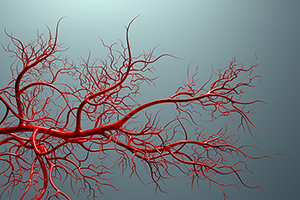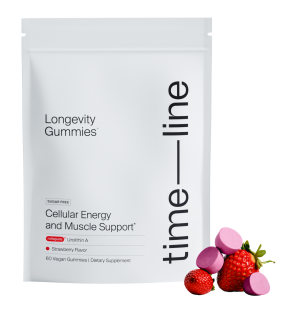Nutrition can support cardiovascular health, and the following article from our friends at Protocol for Life Balance highlights three nutrients that you might consider adding to your wellness portfolio.
This article contains content from one of our trusted sponsors.
Extremely complex and absolutely vital, the cardiovascular system can be divided into 3 main components: the heart, blood vessels (arteries, veins, capillaries), and blood. Each element of this triad has to constantly be at its best to allow the entire system to function properly and to ensure that each cell of the body receives the oxygen and nutrients it needs to thrive, as well as unload the by-products of normal cellular respiration such as carbon dioxide (CO2) and other metabolic by-products. It would not be possible to list in just one article all the dietary supplements available to support a healthy cardiovascular system, as there are supplements that address pretty much every element of this multifaceted system. Therefore, we will focus here on three compounds, each acting at a different level of the cardiovascular system: menaquinone-7 (MK-7), ubiquinol, and nattokinase.*
In order to maintain blood vessel elasticity and normal blood clotting functions, we have vitamin K.* Vitamin K is a group of structurally related compounds known for their multiple bodily functions, including the support of a healthy coagulation.* Vitamin K is also essential for the gamma-carboxylation of glutamyl amino acid residues of GLA proteins, which include proteins involved in extracellular matrix mineralization, such as osteocalcin in bones, and other matrix GLA proteins (MGP) found in cartilage and artery walls.* Vitamin K2 seems to be particularly important for cardiovascular health, as shown in a recently published prospective study following nearly 3,000 adults over at least 10 years. This study showed that there was no statistical association between dietary intake of vitamin K1 and cardiovascular health, while higher intakes of dietary vitamin K2 were associated healthier cardiovascular systems.[1]
Menaquinone-7(MK-7) is a purified form of vitamin K2 with unique biological properties as demonstrated in a clinical study showing that MK-7 supplementation is able to induce prolonged carboxylation of osteocalcin and MGP in the blood.* This effect on carboxylation is dose dependent, which was demonstrated in a 12-week, randomized, double-blind, placebo-controlled trial performed on 60 healthy volunteers receiving either a placebo, 180 or 360 mcg MK-7 daily. At the end of this study, uncarboxylated dephospho-MGP decreased by 31% and 46%, respectively, in the MK-7 supplementation groups, and the ratio between uncarboxylated and carboxylated osteocalcin decreased by 60% in the 180 mcg group and 74% in the 360 mcg group.[2]* These biological effects of MK-7 translate into clinically relevant effects. This has been shown in a prospective double-blind, placebo-controlled clinical trial with 244 healthy post-menopausal women, where MK-7 supplementation (180 mcg/d or placebo for 3 years) resulted in a significant improvement in a marker of arterial stiffness.[3]*
To maintain normal heart and blood vessel function, we recommend ubiquinol.* Ubiquinol is the active reduced form of CoQ10 known to have a superior bioavailability to other forms of CoQ10. At the molecular level, the ability of ubiquinol to exchange electrons is central to cellular energy production and its powerful free radical neutralizing activity is important for the protection of biological membranes against oxidative stress, as well as for regenerating antioxidants such as vitamin C and E.* Scientific studies indicate that ubiquinol can help to support normal cardiovascular function.* Indeed, in a randomized, double-blind, single-center trial, with 51 individuals receiving 100 mg or 200 mg ubiquinol daily, authors observed that ubiquinol significantly improved endothelial function as measured by flow-mediated dilation of the brachial artery.[4]*
Nattokinase is a bioavailable fibrinolytic enzyme isolated from natto, a traditional Japanese fermented soy food that works in a different way to support cardiovascular health: it promotes heart and circulatory health by helping to maintain normal blood fluidity.* Nattokinase is structurally close to plasmin and in vitro studies have demonstrated its ability to dissolve fibrin, an important factor involved in coagulation.* In laboratory experiments, the addition of nattokinase to whole human blood resulted in a dose-dependent decrease of erythrocyte aggregation and viscosity.* A 2-month open-label, clinical trial with 45 subjects investigating the effect of taking a daily dose of 2 capsules of nattokinase [2,000 fibrinolysis units (FU) per capsule] revealed a significant reduction in plasma levels of fibrinogen (by 9%), factor VII (by 14%), and factor VIII (by 17%).[5]* Furthermore, in a randomized, double-blind, placebo-controlled trial, 86 participants receiving nattokinase (2,000 FU/capsule) for 8 weeks, researchers observed a significant reduction in blood pressure already within the normal range.[6]*
As described above, MK-7, Ubiquinol, and nattokinase are clinically evaluated compounds working at different levels of the structure and function of blood vessels.* In addition, nattokinase and vitamin K are known to impact blood coagulation in various different ways and may help maintain normal blood fluidity.* These three compounds have complementary mechanisms of actions that contribute to and support cardiovascular health.*
Protocol For Life Balance® offers MK-7 alone or in combination with other ingredients at dosages of up to 300 mcg per capsule, ubiquinol at 100 mg and 200 mg per softgel, and nattokinase at 2,000 FU per caspule. Protocol For Life Balance® also has an extensive line of products that are useful for cardiovascular support, allowing you to tailor your supplementation program to your unique cardiovascular health needs.*
References:
- Haugsgjerd TR, Egeland GM, Nygård OK, et al. BMJ Open. 2020;10(5):e035953.
- Dalmeijer GW, van der Schouw YT, Magdeleyns E, Ahmed N, Vermeer C, Beulens JWJ. Atherosclerosis.225(2):397-402.
- Knapen MH, Braam LA, Drummen NE, Bekers O, Hoeks AP, Vermeer C. Thromb Haemost. 2015;113(5).
- Sabbatinelli J, Orlando P, Galeazzi R, et al. Nutrients. 2020;12(4):1098.
- Hsia C-H, Shen M-C, Lin J-S, et al. Nutrition Research. 2009;29(3):190-196.
- Kim JY, Gum SN, Paik JK, et al. Hypertension research : official journal of the Japanese Society of Hypertension. 2008;31(8):1583-1588.
* These statements have not been evaluated by the Food and Drug Administration. These products are not intended to diagnose, treat, cure, or prevent any disease.







